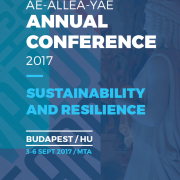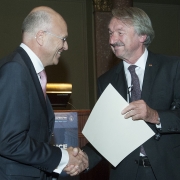Archive for month: September, 2017
ENERI lays foundation for European training platform for research integrity
On 28/29 September 2017 the ENERI (European Network of Research Ethics and Research Integrity) project hosted their first stakeholder workshop on Research Ethics and Research Integrity in Athens.

Stakeholders during one of the presentations of the ENERI workshop in Athens. Credit: ENERI
The aim of the workshop was to bring together practitioners in Research Ethics and Research Integrity (RE/RI) from across Europe to discuss existing infrastructures and challenges in different research systems on the continent. Participants were invited to brainstorm and conceptualise concepts for improved training in RE/RI.
The stakeholder workshop is part of a project deliverable to develop an online training course for research integrity committee members. Particular emphasis was put on the transnational comparability as to establish shared research integrity procedures in countries participating in Horizon2020.
The outcomes of the workshop will feed into the conceptualisation of an online training platform
ALLEA is represented in the project via its Permanent Working Group Science & Ethics of which Krista Varantola attended the workshop. In the preparation of the workshop, the working group suggested Deborah Oughton of the Norwegian University of Life Sciences as a keynote speaker on Movements and Developments regarding training in RE/RI with a particular focus on her work in Norway. The outcomes of the workshop will feed into the conceptualisation of an online training platform, which will serve as a foundation for European research integrity practitioners, especially also in countries with underdeveloped structures in that regard.
ALLEA Prize used to set up “Fund Lenaerts-Grimonprez” for a stronger EU dimension at school
Koen Lenaerts, Professor of the University of Leuven and President of the Court of Justice of the European Union, was awarded the 2017 ALLEA Madame de Staël Prize for Cultural Values in Budapest at the Hungarian Academy of Sciences on 4 September 2017
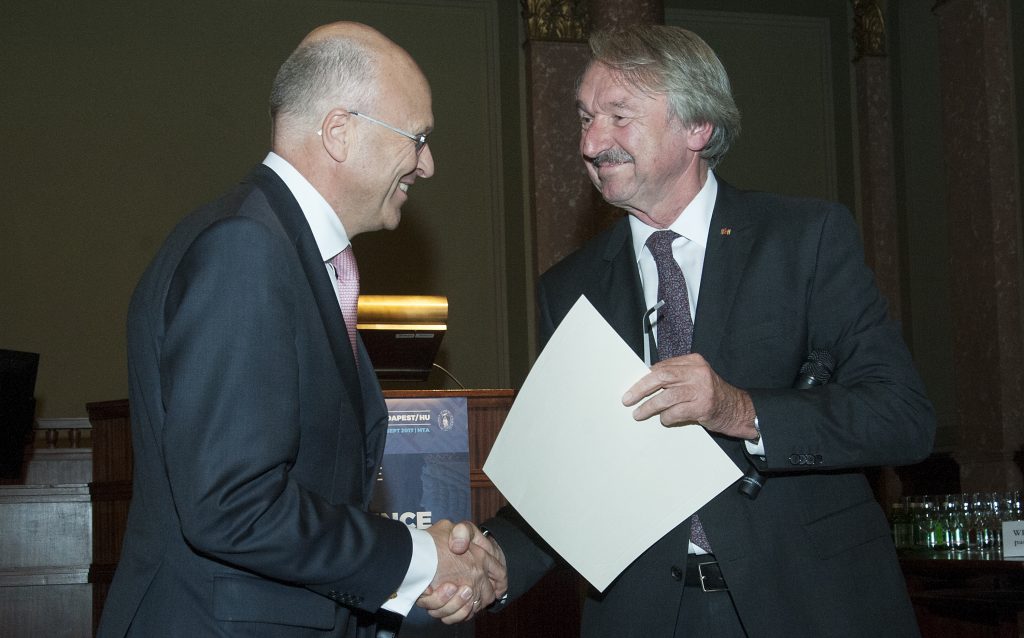
Koen Lenaerts (University of Leuven) receives the 2017 ALLEA Prize certificate from ALLEA President Günter Stock. Credit: MTA/Szigeti Tamás
On 4 September 2017, Koen Lenaerts was awarded the 2017 All European Academies Madame de Staël Prize for Cultural Values in Budapest at the Hungarian Academy of Sciences to honour his outstanding scholarly contribution to European law. This prize, endowed with 20 000 euros, was established by ALLEA, the European Federation of Academies of Sciences and Humanities, and co-sponsored by Compagnia di San Paolo.
Koen Lenaerts has donated the ALLEA prize as a starting capital to a new Leuven University Fund that he created together with his wife, Kris Grimonprez, both alumni of the Faculty of Law of Leuven University. The Fund is named ‘Fonds Lenaerts-Grimonprez voor een sterkere EU dimensie op school’ (‘Fund Lenaerts-Grimonprez for a stronger EU dimension at school’).[1] The Fund is an organisation within the University, governed by a steering board in which the donor Koen Lenaerts and his wife are represented, as well as several academics of the Leuven University. Vice-Rector Bart Raymaekers is its financial manager.
The purpose of the Fund is to raise the quality of EU learning at school. Specifically, it seeks to broaden and deepen the EU dimension within key competences acquired by pupils at school.
Raising the quality of EU learning at school
The purpose of the Fund is to raise the quality of EU learning at school. Specifically, it seeks to broaden and deepen the EU dimension within key competences acquired by pupils at school. Reflecting the importance of the EU in society, the EU dimension should be more consistently present in the learning content of several subjects in primary as well as in secondary education. For example, it does not suffice to learn about the European Coal and Steel Community in history, or to know some EU institutions. The aim is to empower all young people (not only pupils in some optional courses) to become conscious EU citizens who are informed and critical thinkers, combining their national identity with a European one, ready to participate in the democratic life of the Union. Democracy presupposes enlightened citizenship.
To this end, support will be given to the training of future teachers and research about the EU dimension in school curricula and learning outcomes. In this context, modules with a specific EU dimension and adequate teaching materials will be developed. The essential starting point are the texts on which the EU is founded (the EU Treaties and the Charter of Fundamental Rights of the European Union) and the EU values and principles that they express. As the EU and its Member States are based on democracy, respect for fundamental rights and the rule of law, this Fund also aims to work in line with the Charter on Education for Democratic Citizenship and Human Rights Education of the Council of Europe,[2] whereby in particular its EU dimension needs to be concretised.
The Fund wishes to reach the ‘ordinary’ pupil in mainstream education, living in Belgium and attending school in Flanders or in a Dutch language school in Brussels. The money is not designated to support mobility of pupils or teachers, nor is it for language learning or extra-curricular activities.
An annual prize may be awarded for work corresponding to criteria set up in detail in different phases. If the project leads to successful results, translation of modules into other EU languages as well as European cooperation may be envisaged.
*Text provided by the Fund Lenaerts-Grimonprez
[1] http://www.kuleuven.be/mecenaat/en
[2] http://www.coe.int/en/web/edc/charter-on-education-for-democratic-citizenship-and-human-rights-education
Europe’s Sustainability and Resilience under discussion
Near to 400 participants attended the conference “Sustainability and Resilience” in the Hungarian Academy of Sciences in Budapest on 4-6 September.
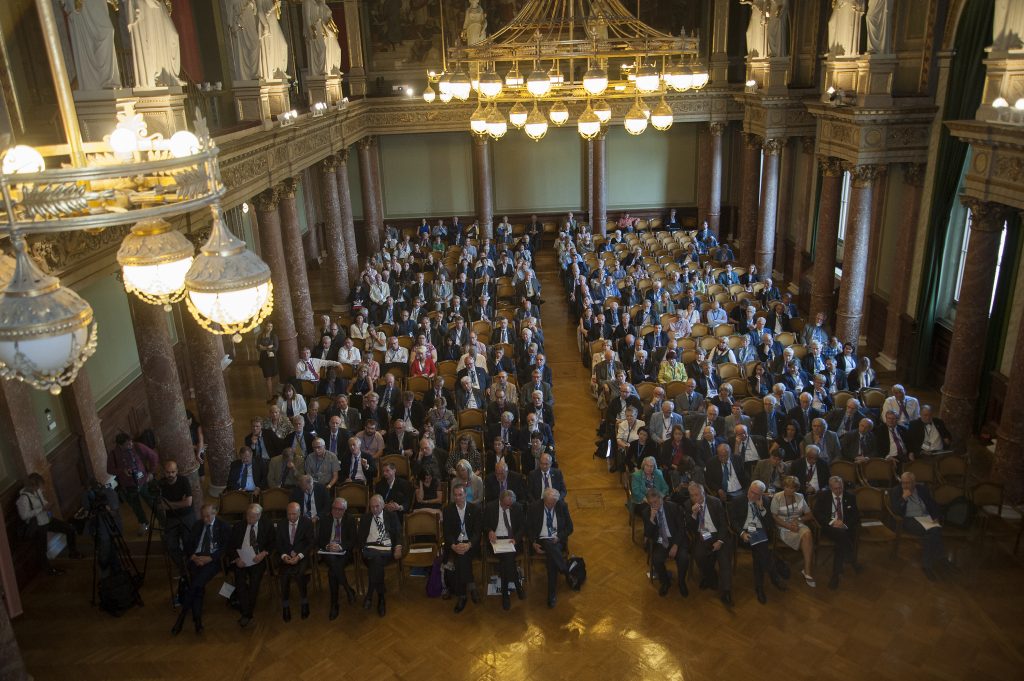
View of the conference hall at the Hungarian Academy of Sciences in Budapest on 4 September 2017. Credit: MTA/ Szigeti Tamás
The event brought together renowned scientists and scholars to discuss Europe’s heritage, social systems, health, economy, climate, as well as its science and research landscape. The conference was opened by the President of the Hungarian Academy of Sciences László Lovász, who underlined the relevance of a united voice for European academic organisations. “We have to remember that the great history of European science by itself is not a guarantee for a great future. Only by a continued effort we can build the ‘Resilience and Sustainability’ of our unique scientific culture. A culture that has always been defined by the diversity of talents across Europe and should continue to rely on the potential of science in all member states. This is why I have been so pleased to offer the building of our Academy to host the first joint meeting of three major European science organisations. I see this conference as a major step towards a more united voice of European academic organisations,” Lovász said in a statement.
“We have to remember that the great history of European science by itself is not a guarantee for a great future. Only by a continued effort we can build the ‘Resilience and Sustainability’ of our unique scientific culture”, said President of the Hungarian Academy of Sciences László Lovász.
From neurons to science advice
The panels provided an interdisciplinary roadmap on European science today: from the latest advances of neuroscience to the impacts of climate change in human health or how academies provide advice to decision-makers at the national and European level.
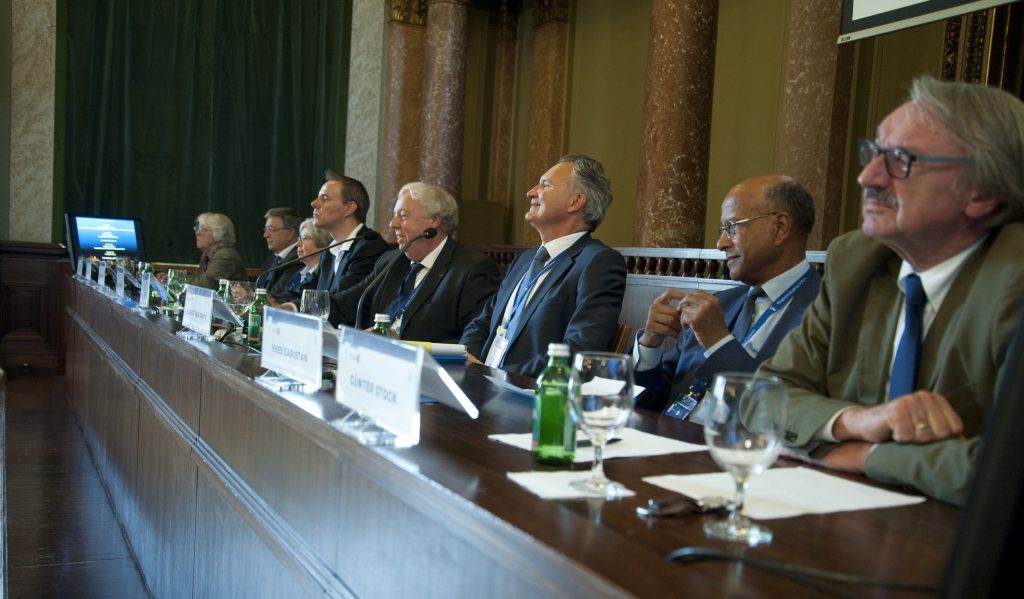
Panel discussion on the role of academies in the Scientific Advice Mechanism (SAM) with ALLEA President Günter Stock, Yves Caristan (Euro-CASE), Robert Jan-Smits (DG for Research and Innovation) and Sierd Cloetingh (Academia Europaea) (from front to back). Credit: MTA/ Szigeti Tamás.
The President of the Royal Netherlands Academy of Arts and Sciences (KNAW) José van Dijck reflected on the challenges to European public values in a global online society. Jointly with other academy and policy representatives, ALLEA President and Chair of SAPEA Günter Stock shared a panel with the European Commission’s Director-General for Research and Innovation Robert-Jan Smits on the lessons learned from their involvement at the Scientific Advice Mechanism (SAM).
Antonio Loprieno elected next President of ALLEA
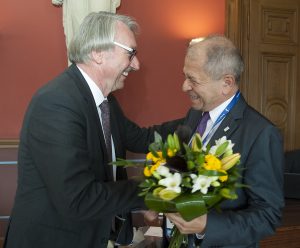
ALLEA President Günter Stock congratulates Antonio Loprieno following his election as next President of ALLEA. Credit: MTA/Szigeti Tamás
ALLEA Member Academies elected in Budapest on 4 September Professor Antonio Loprieno as the next ALLEA President for the term 2018-2021. President-elect Loprieno will assume his position during the next General Assembly at the Bulgarian Academy of Sciences in Sofia in May 2018, following the end of the second term of ALLEA President Günter Stock.
The General Assembly, ALLEA’s highest legislative body, voted in favour of Loprieno during the 18th annual business meeting celebrated at the Hungarian Academy of Sciences. His candidacy is supported by the Swiss Academies of Arts and Sciences.
President-elect Loprieno (1955, Bari, Italy) is a renowned scholar of great repute in Egyptology, Linguistics, and Semitic Languages, and an experienced leader of academic and public institutions in Switzerland and internationally. He was Rector of the University of Basel (2006-2015) and President of the Conference of University Rectors in Switzerland (2008- 2015). Currently he is President of the Austrian Science Board (Österreichischer Wissenschaftsrat) and President of the Swiss Studies Foundation, among others.
In a statement, Loprieno reflected on his election and on his vision for the role of European academies in society. “European academies and learned societies are a mirror and a bridge: a mirror of continental excellence in science and humanities, and a bridge between knowledge production and knowledge society. In view of the current scientific and societal challenges, more than ever we now need both. I feel honored to contribute my share to the visibility of European research and to the development of a science policy that strengthens the role and the impact of science and humanities in shaping European moral values as well as political and economic choices.”
“I feel honored to contribute my share to the visibility of European research and to the development of a science policy that strengthens the role and the impact of science and humanities in shaping European moral values as well as political and economic choices.”
New ALLEA Member and New Working Group
During the business meeting, ALLEA Member Academies voted in favour of accepting Bilim Akademisi (The Science Academy, Turkey) as full member of ALLEA. Bilim Akademisi was established in Istanbul on 25 November 2011 as an independent non-governmental entity with a mission to promote, to model and to protect scientific merit, excellence, independence, and integrity. The Academy was founded by former members of the Turkish Academy of Sciences (TÜBA), following a decree by the government of Turkey in August 2011, which changed the academy’s structure and appointment procedures.
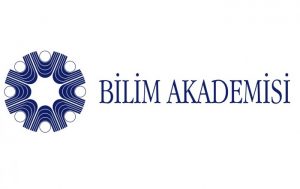
In response to current challenges, ALLEA is establishing a new working group investigating the dynamics of public trust in expertise in the so-called “post-truth” era. The alleged loss of trust in science and evidence, its underlying causes, the way different disciplines are dealing with it, and questions on how valid knowledge can and should be acquired, will be the focus of this group. It will be co-chaired by Baroness Prof Dr Onora O’Neill from the British Academy, and ALLEA Vice President Prof Dr Ed Noort.
Koen Lenaerts, 2017 ALLEA Madame de Staël Prize Laureate
Following the ALLEA General Assembly, ALLEA celebrated the award ceremony for the 2017 All European Academies Madame de Staël Prize for Cultural Values. This year, Professor Koen Lenaerts was awarded the ALLEA Prize to honour his extensive scholarly work on European law and his reflections on European jurisdiction. He is a Professor of European law at the Katholieke Universiteit Leuven and President of the Court of Justice of the European Union (CJEU). His publications represent a thorough and impeccable analysis for understanding the EU’s judicial system and the democratic values on which it is based. “Law is at the origin of the European idea and the basis for free societies, and
this year the Prize Jury decided to honour a scholar with a truly European track record in law”, stated ALLEA President Günter Stock, Chair of the Prize Jury.
Lenaerts is the fourth scholar to be honoured with the ALLEA Prize, which is endowed with 20,000 EUR, thanks to kind co-sponsorship of the Italian foundation Compagnia di San Paolo.
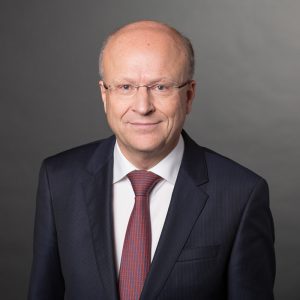
Koen Lenaerts, 2017 ALLEA Prize laureate
Learn more about the ALLEA Prize at: https://allea.org/prize/about-the-prize/
Academia Europaea – ALLEA international conference on “Sustainability and Resilience”
As part of the ALLEA General Assembly, an international scientific conference with the title “Sustainability and Resilience” is organised on 5-6 September in partnership with Academia Europaea and with the kind collaboration of the Hungarian Academy of Sciences and the Young Academy of Europe. The two-day event brings together renowned scientists and scholars to discuss the various aspects of Europe’s Sustainability and Resilience: its heritage, its social system, its health, its economy, its climate, as well as its science and research landscape.
Learn more about the conference at: http://ae-allea-yae-conference2017.org/
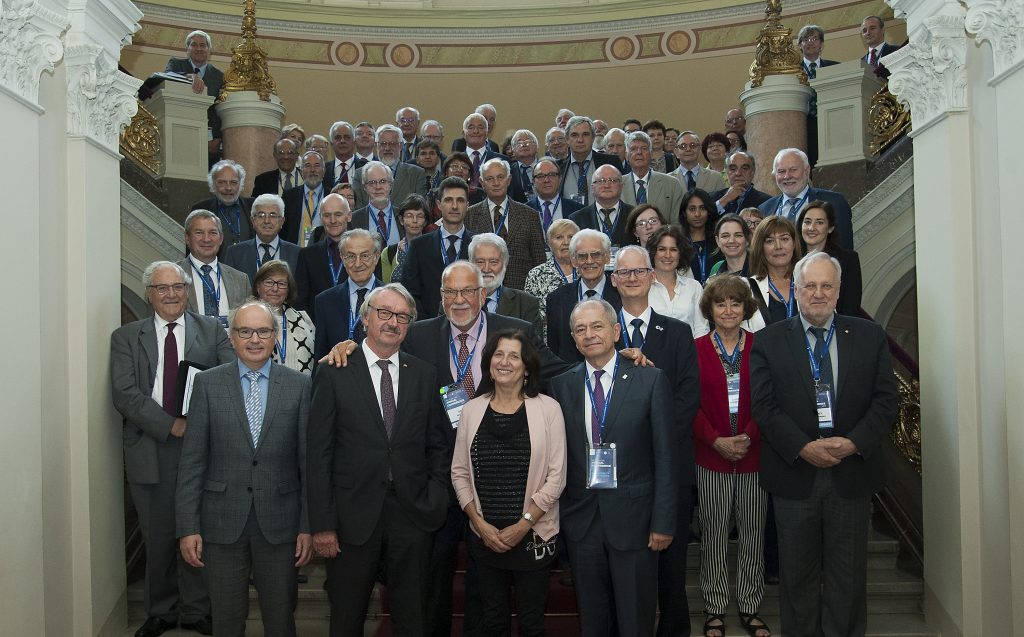
Delegates of the ALLEA General Assembly in Budapest at the Hungarian Academy of Sciences. Credit: MTA/Szigeti Tamás
ALLEA Board starts preparations for the 2018 Presidency transition
ALLEA Board Members convened at the Hungarian Academy of Sciences in Budapest on 3 September 2017 and started preparations for the upcoming transition of the ALLEA Presidency.
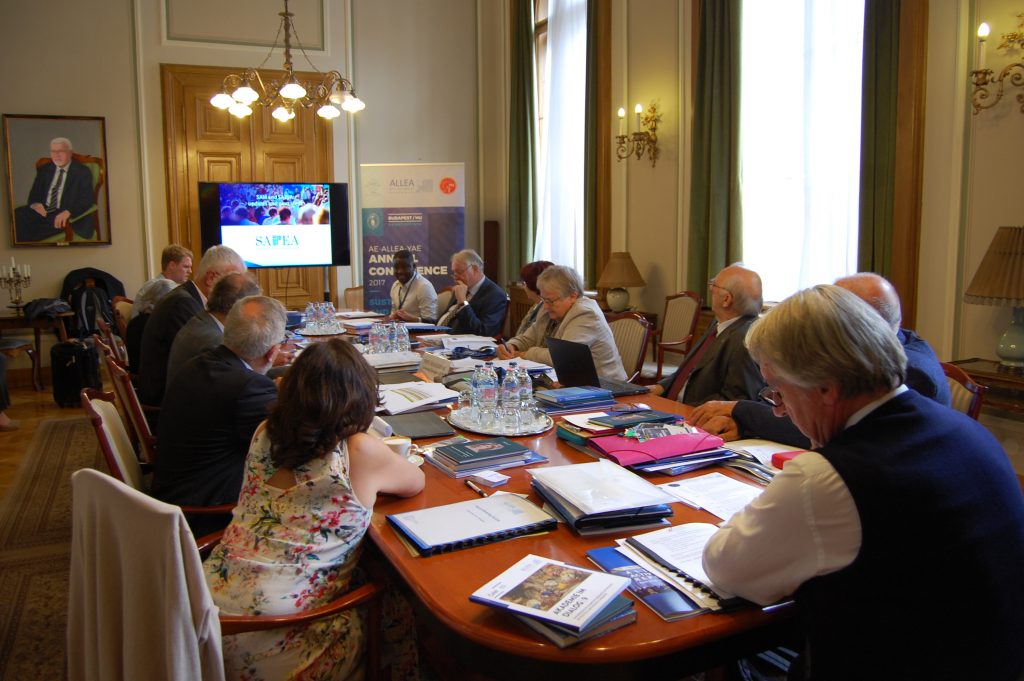
ALLEA Board during their discussions in Budapest at the Hungarian Academy of Sciences on 3 September 2017.
The ALLEA Board Members met on 3 September 2017 at the Hungarian Academy of Sciences in Budapest. Participants discussed the next steps for ALLEA, including upcoming publications, working group and SAPEA activities, and the first steps of the new working group “Trust, Truth and Expertise”.
The participants also assessed next actions in preparation of the Presidency transition, which will take place during the next General Assembly in Sofia in May 2018. During the transition, six of the current Board Members will conclude their term. The ALLEA Secretariat already sent a call for nominations to Member Academies asking for proposals of Academy Fellows to renew the Board. ALLEA delegates will vote on the candidates at the General Assembly in Sofia in May 2018.

